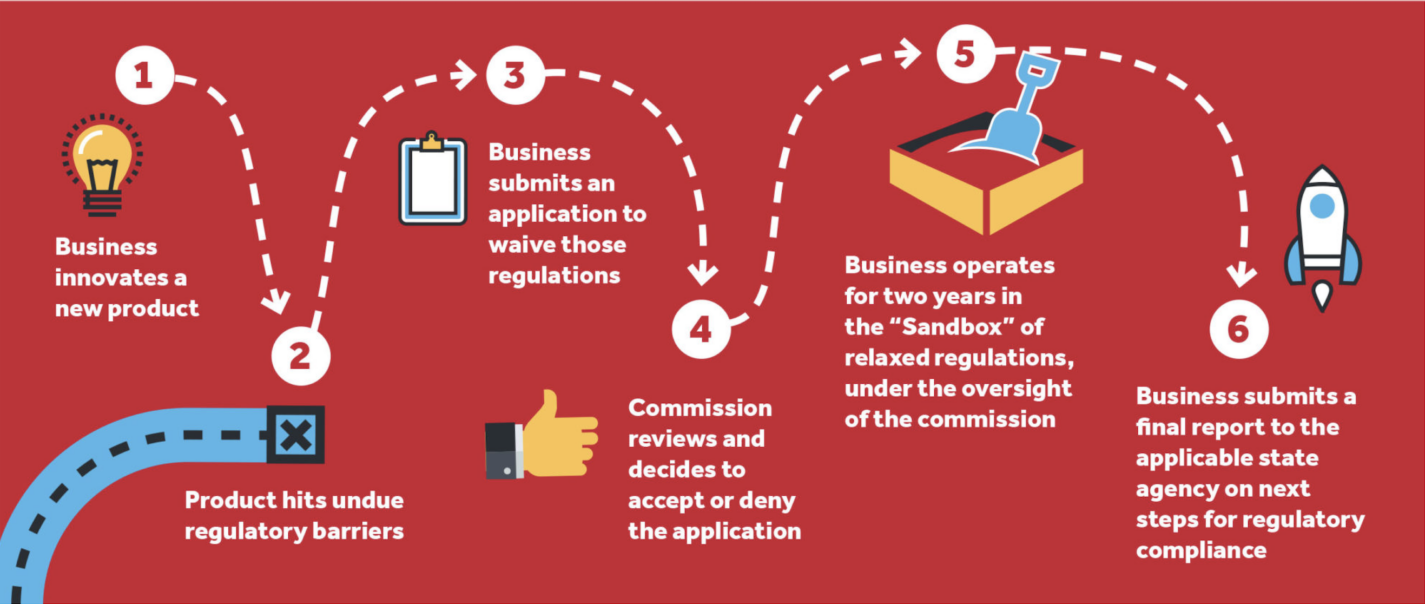- Recognizing that overregulation is stifling innovation, a regulatory sandbox allows for an incubation period for new products and services under a guided relaxation of legal and regulatory stringencies
- The General Assembly created North Carolina’s regulatory sandbox in 2021 for financial and insurance goods and services
- Making our regulatory sandbox open-ended like Utah’s would bring enhanced innovation to agriculture, legal services, and any number of other industries
In 2021 North Carolina joined a growing movement in the states and around the world to experiment with regulatory freedom. The General Assembly created the “North Carolina Regulatory Sandbox” for financial and insurance services (FinTech and InsurTech for short).
The program is implemented by the North Carolina Innovation Council, which was created for the purpose of “support[ing] innovation, investment, and job creation within North Carolina by encouraging participation in the regulatory sandbox.”
The idea of a regulatory sandbox comes from the recognition that the state’s “legal and regulatory frameworks are restricting innovation.” Overregulation, outdated legal restrictions, and the uncertainty of the risk environment from future laws and regulations can discourage entrepreneurial risk-taking and therefore prevent many new ideas from even getting a chance. Consumers and service providers are left worse off for no other reason than being stuck in an unwieldly regulatory regime.
As the Locke Foundations’s Policy Solutions report explains, “regulation tends to protect the ‘old ways’ and prevent new ideas.” The Innovation Council’s “Purpose” page says that the regulatory sandbox lets entrepreneurs “temporarily test an innovative financial or insurance product or service and make it available to consumers on a limited basis without being subject to certain licensing or other regulatory obligations imposed under applicable State law.” The law permits these innovative products and services to test out up to two years under this relaxed regulatory framework (there can be extensions).

The need to expand North Carolina’s regulatory sandbox
Since North Carolina already has in place a regulatory sandbox and the Innovation Council to support it and drive participation in it, there is no reason to keep it limited to FinTech and InsurTech. Expanding our regulatory sandbox would benefit consumers and innovators in a host of other industries.
For that reason, expanding North Carolina’s regulatory sandbox to all industries is one of Locke’s top policy recommendations.
One industry in particular that could benefit from inclusion in the regulatory sandbox is agriculture, one of the most important industries in North Carolina. Carolina Journal reported recently that the American Farmland Trust ranked North Carolina second in the nation for threatened farmland. For North Carolina’s agricultural productivity to keep up with population growth, our farmers will need to keep finding newer, better methods.
My colleague Kelly Lester has discussed hog waste management as one area that could benefit from innovative thinking. As Lester has shown, current waste management practices are hampered by legal and regulatory obstacles that make it extremely difficult for any new, price-competitive practice to emerge and be tried. Essentially, the government has taken upon itself to solve the hog waste management problem, and so it persists.
It’s precisely for helping the private sector thread its way out of this legal and bureaucratic tangle that regulatory sandboxes were instituted. As Lester put it,
Entrepreneurs and farmers should be free to experiment with alternative waste disposal methods, such as closed-loop systems, waste-to-energy technologies, or other potential solutions. Consumer preferences and innovations, rather than government mandates, should guide industry practices. …
Expanding the state’s regulatory sandbox to include agricultural technology, products, and services would allow farmers and agribusinesses who opt into the sandbox the opportunity to try innovative technologies that the standard regulatory approach would preemptively block. Many states have regulatory sandboxes for select industries, and Utah has an open-ended regulatory sandbox.
A competitive market with greater regulatory freedom would encourage hog farmers to adopt more efficient and sustainable waste management practices voluntarily. By allowing a diversity of approaches, the market can reward the most effective and eco-friendly methods, meeting consumer demands and strike a better environmental balance without government interference.
Utah already has an open-ended regulatory sandbox. Like North Carolina’s, it started out small, for legal services. The University of Denver’s Institute for the Advancement of the American Legal System (IAALS) studied it and found it showed “extraordinary promise” and was “bringing a variety of safe legal services to thousands of consumers.”
The IAALS noted the wide spectrum of legal help it has opened to Utah consumers: “innovative providers are meeting a spectrum of needs, including end-of-life planning (19.6%); business-related matters such as intellectual property, contracts and warranties, and entity incorporation (22.3%); and marriage and family (15.0%). Other types of legal services currently available via the sandbox include education, real estate, domestic violence, and immigration.”
Impressively, even though established legal firms might be tempted to fight the regulatory sandbox for legal services out of concern it could trespass their licensed territory, the American Bar Association (ABA) has written in support of it. The ABA even “adopted a resolution encouraging states to consider innovations that could increase the accessibility, affordability, and quality of civil legal services.”
Right now, of course, North Carolina’s regulatory sandbox does not cover agriculture, legal services, or any number of other industries. Nevertheless, reviews continue to find consumers and entrepreneurs mutually benefiting from regulatory sandboxes. They are helped by the sandboxes’ incubation periods for new products and services under a guided relaxation of legal and regulatory stringencies.
To broaden its benefits to more consumers and providers, the General Assembly should open North Carolina’s regulatory sandbox to all industries.


